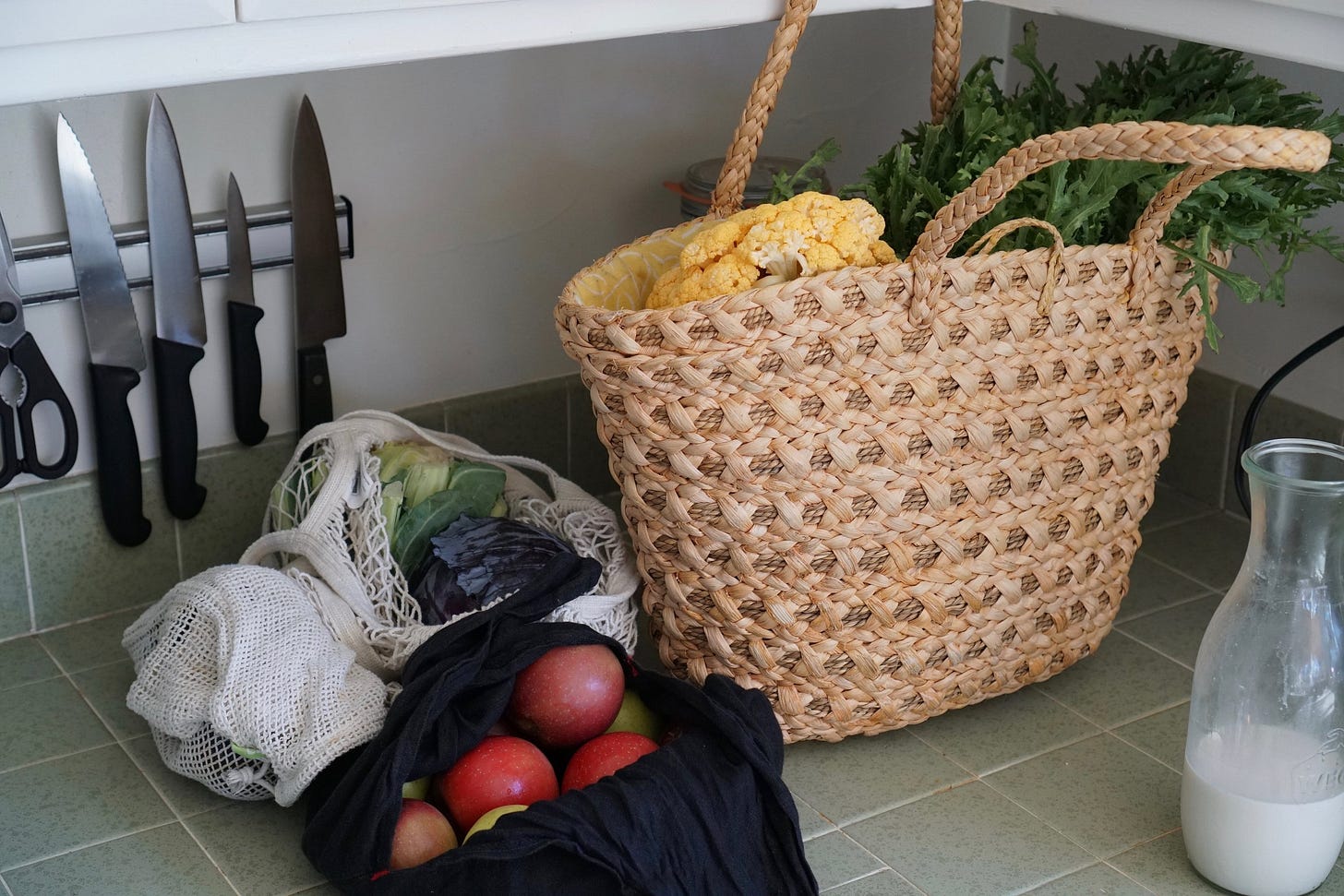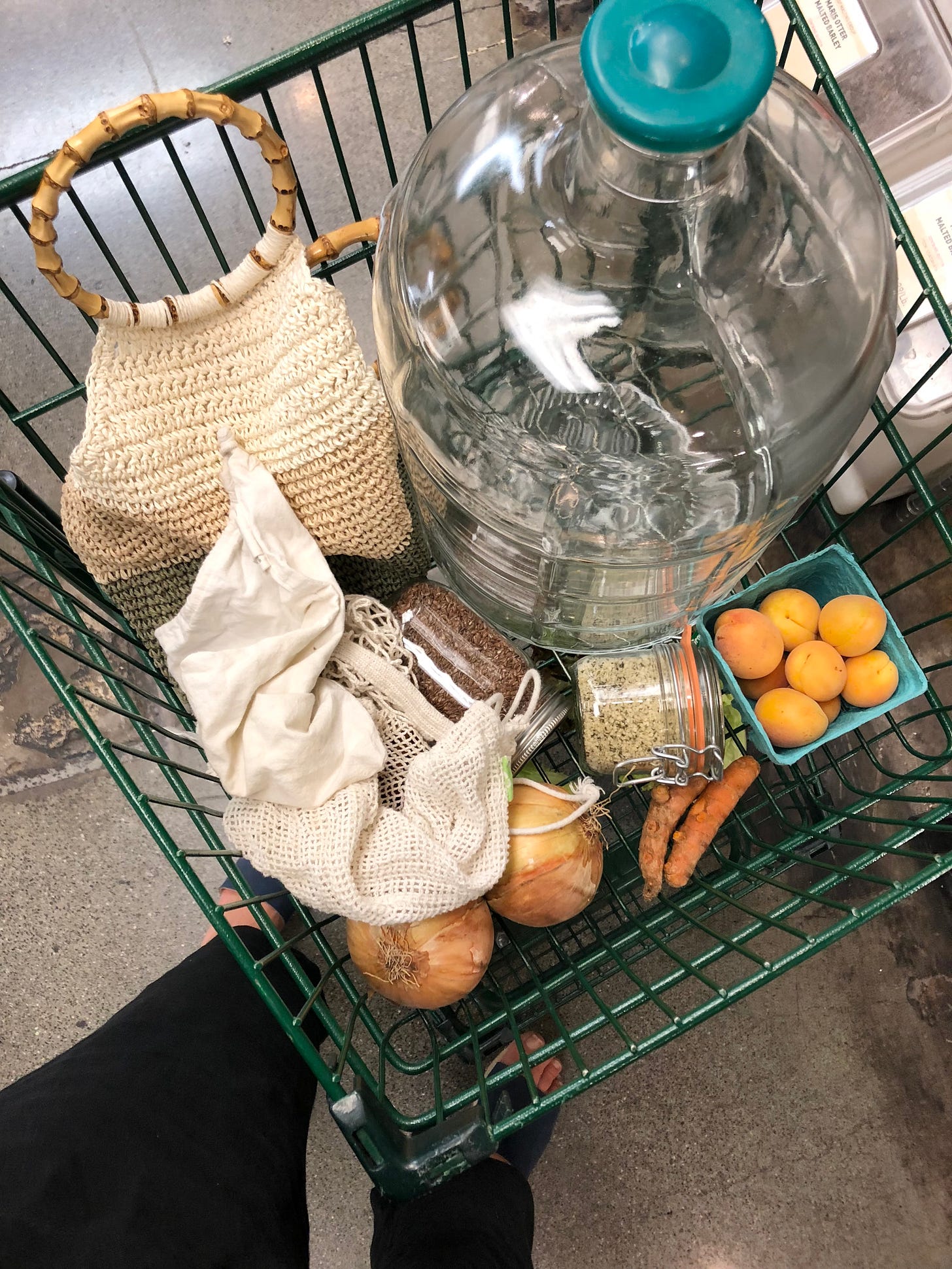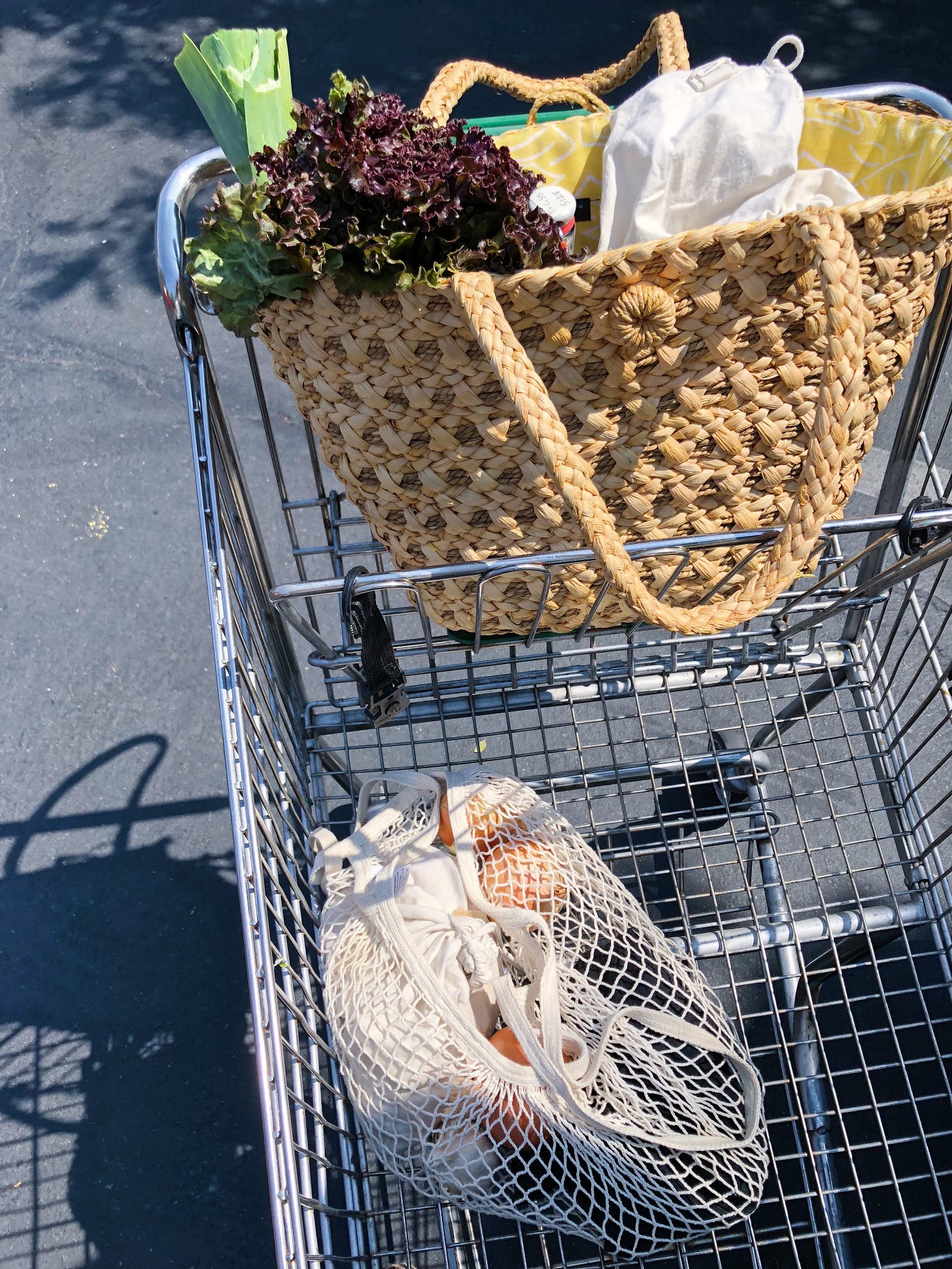Welcome to mamaeats, a twice-weekly newsletter (Tues. & Sat.) inspired by a simple + seasonal home life. I’m a mother of three, avid reader, gardener, and home cook who focuses on nourishing, whole food meals with a focus on plants. This newsletter is my labor of love—if you are not already, and are able to do so, please consider becoming a subscriber to support my work here, which takes time and effort. Doing so gives you access to all the archives and recipes (find the recipe index here), as well as cook-along videos which go along with most recipes. If a recurring payment is too much for you right now, but you’d still like to contribute, I’d be delighted to receive a one-off tip via my ko-fi. As always, thank you for being here, reading this newsletter, and sending me your thoughts.
This is my routine for shopping with less waste, both plastic waste from packaging, and food waste from uneaten food. Sustainability is something that feels important to me, and I’m sure, to everyone—taking care of this fragile, beautiful earth that we are stewards of.
With the weather being lovely lately, it’s been easier to always get to our twice weekly farmers market. I bike there most of the time— for enjoyment, exercise, and reducing my carbon footprint. I strive for the market/CSA box and my small backyard vegetable garden to be my main source of food, which feels both like a small act of revolution, and an incredible luxury. In buying from farmers directly, I circumvent packaging and vote with my dollar for another model of food—one I believe in, which supports and elevates farmers as one of the most important jobs in society, nurtures community relationships, reinvests money back into my small community, and provides wholesome food. I realize this is not a possibility for everyone (many of our systems are so deeply broken) but since I live in an agricultural heartland and we are comfortably above the poverty line, I feel I would be remiss if I did not prioritize my values here.
Even though I do shop at the market for many of my needs, there are things I can’t buy there: vinegars, beans, certain grains, coffee, pastas, and the like. For those, I support the next best place: my local food co-op. Co-op is short for co-operative, meaning that it is owned and democratically governed by members- profits get reinvested back into the business, the members, and the community. I am lucky that my co-op has an excellent selection of bulk foods, but you can often find bulk in other types of stores, too: my friend lives near a Winco and they have an incredible, and affordable, bulk selection. I also sometimes order bulk things online in large quantities for things we go through alot of, or which I can get a much better deal on directly from the supplier, like chickpeas, lentils, olive oil, tahini, and dates.
Here’s the main points I try to stick with in my shopping:
i. buy what you need. Don’t buy more than what you’ll use before it goes bad. This is tricky, and it can take a while to be able to gauge correctly for your specific household needs, but if you start paying attention to what you go through in a week, you can get a better idea. For our household, it also helps immensely to meal plan, which allows me to buy very exactly. For others, this system doesn’t work as well— experiment and see what is good for you.
ii. shop more often. this is subjective to your lifestyle, but I find that when I shop more often for fresh produce, I waste much less, as we’re eating it that day or the next few days. Less time in the fridge, fresher food, less food waste. We have a store a few minutes away from our house, so this works for us, because I can pop in for whatever I need- and can bike or walk there easily and safely. I shop the farmers market on Saturdays, and a local fruit stand on Wednesdays- that way I get topped up halfway through the week, only replacing what we need more of.
iii. shop less often. on the flip side, I try to shop less often for bulk dry goods. I buy big quantities of things we go through a lot, our staples. This means less packaging, less cost, and less trips to the store—plus, I always have ingredients to supplement any fresh produce that I buy at the market and round out a meal. The specifics will vary based on the staples for your household. These are some examples of ours:
dried chickpeas, cannellini beans, beluga lentils
rice, pasta, farro, buckwheat, oats
olive oil, lately I’ve been buying a 5L tin from here
red wine vinegar, I buy this Corti Brothers 1/2 gallon glass jug
tahini, I buy 32 ounce glass jars from our local fruit stand
canned whole tomatoes, and double concentrate tomato paste
medjool dates, I get the 15 lb box of “grinders”, which are seconds, from here
iv. shop with the seasons, and more plants. Seasonal food is fresher, tastier, often cheaper, more likely to be local, and ties us back to the natural rhythms of life on earth.
v. shop locally as much as possible. To support your community, to eat fresher food, to naturally eat with the seasons, to reduce the enormous carbon footprint of shipping things halfway around the world, to avoid disrupting the fragile ecosystems of other places for the commercialization of “superfoods”.
vi. shop as low waste as possible. For me this means:
knowing where my local places are that offer bulk, and having my reusables accessible when I’m ready to shop. It takes a bit of advance preparation, but not much. My reusables for the market: some drawstring bags and/or bento bags and a straw basket or sturdy canvas tote to carry it home in. For the co-op bulk section: some glass jars for wet goods and the same small cloth bags for bulk goods. I put things directly into my cart if it doesn’t need a bag.
choosing products which are naturally package free, or packaged in natural materials such as paper, glass, metal, or cloth.
vii. when possible and practical, make it yourself. This not only cuts down on packaging, but also helps me to save money and eat healthier. I make our burger buns, granola, bread, pita, hummus, nut milk, nut butter, and lots of other things. Of course, this costs time and effort and dishwashing. You absolutely do not need to make all these things. Perhaps, if you’re curious, try replacing one thing you normally buy in plastic with a homemade recipe and see how it goes.
Sometimes I need to pop into a store impromptu and am not prepared at all. I always keep a string tote in my bag for that purpose, it rolls up quite small and is very lightweight but can stretch to accommodate an impressive amount. It’s also an excellent beach or pool tote because the sand/water can fall right through. These bags are so chic, they always makes me think of Sophia Loren in Yesterday, Today, and Tomorrow — I think hers was lime green.
Post-shopping, I have a few rituals that help to reduce waste:
clean the produce. I will absolutely use that lettuce or eat those carrots if they are already washed and ready to go. Yes, I am that lazy sometimes that the thought of washing something deters me from eating it.
label and date food containers and jars. I keep a roll of masking tape and a sharpie in the kitchen drawer by the fridge. Anything that goes in it (or the freezer) that’s in a container gets labeled and dated. For example: hummus 6/10. It helps anyone getting into the fridge to know what’s available to eat in there, and also helps when I know that the leftover rice was from a few days ago, not last week. I also try to keep a dedicated section of the fridge for food that needs to be eaten within the next couple of days.
freeze things to reduce waste. If there’s anything that’s going to go off soon, I freeze it: fruit that is ripe but we have too much of it to eat right away, bread that we won’t make it through, beans I cooked, tomato sauce that I want to save for next week’s pizza…
reuse jars. Anytime I buy something in a glass jar, it gets reused. It means I always have a container available to give away food or sourdough starter in, store leftovers in, house all the little food projects I make (furikake, kimchi, sauerkraut, preserved lemons, jam, dried herbs or chiles from the garden, hot sauce, etc ad infinitum)
Lastly, fret not when you must use plastic. Sometimes other things can and should take priority over being sustainable- mental health, financial health, cultural foods that fill our cup, products we haven’t found a package free alternative for yet. The point is to cultivate the awareness, do our best, and advocate for change when applicable.
ps- a little extra, a video I made in 2019 (!!) for my short-lived YouTube channel: “zero waste farmers market haul + storing it without plastic”. Please forgive the horribly shaky footage, I was just learning how to shoot video, but I thought it might still be fun to watch. In the video, I say that I wash greens as I need them, perhaps I was less lazy then, lol. Everything else remains the same!









of course, loved the video and learned a lot from it! I wonder if those bags are still available. And, the broccoli - who knew! I get a weekly CSA box and tend to quickly just put stuff away. You’ve inspired me to take a little more time next week!! Thank you : )
Thanks for sharing all the details, Amanda! Such great reminders for ways to be more sustainable in every day choices when it comes to groceries.